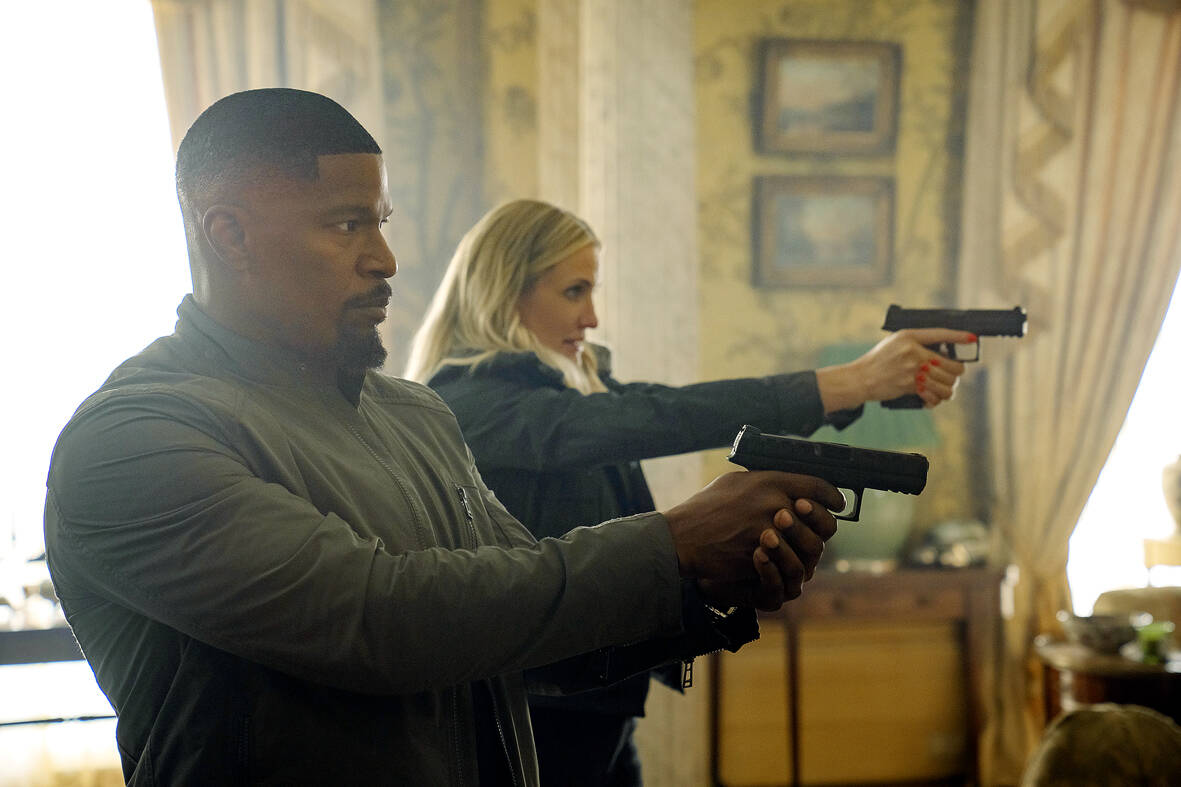But, we do Wordle!!
Er, OK. That’s how former secret agent Matt (Jamie Foxx) explains that he and wife Emily (Cameron Diaz) are now living a boring, mundane, glamour-free life and nobody would ever be looking for them.
To which the rest of us Wordle players say: Whoa, speak for yourself, Matt! Lots of us play Wordle and we don’t think WE’RE boring or mundane.

Photo: AP
Anyway! More to the point is that Matt’s explanation obviously doesn’t work, because within a moment he and Emily are, yes, Back in Action. It’s not only the title of director Seth Gordon’s film, but the story of Foxx’s co-star, Cameron Diaz. Back in movies after more than a decade, Diaz retains her easy charm and has chemistry with Foxx.
But this doesn’t mean their lines are funny or logical. Often, they are neither.
We start 15 years ago, in a pre-credits sequence featuring our ultra-cool co-spies (also lovers). Their job is to pose as French arms dealers visiting the home of a shadowy Russian terrorist — then break into a safe and steal a key to the entire world’s infrastructure or something.

Photo: AP
On the private jet headed back home, Emily reveals a secret we already knew: her home pregnancy test was positive. Actually, all six of them were.
Matt says he’s all in. They break out the champagne (well, for him.) And then all heck breaks loose and they end up needing to kill a bunch of people and parachute into the snowy mountains. It’s indeed funny when Matt observes: “We can’t keep doing this, especially with that baby on the way.”
Flash forward 15 years and the couple, having gone underground, live in a comfy suburban house with two lovely (and barely annoying) teenagers. Matt coaches the soccer team. The teens, Alice and Leo (McKenna Roberts and Rylan Jackson, both appealing), are not aware of their parents’ high-flying past; Matt and Emily want their lives to be normal.
Director Gordon, who co-wrote the script with Brendan O’Brien, has said he was aiming to explore what might happen when spies become parents. Now, without knowing too many spy couples, or any, I’m pretty sure what happens is NOT that the parents become SO uncool SO fast that they buy binoculars on Amazon to spy on their daughter’s social life from the car at school dropoff. Guys, at least hide so she doesn’t see you. Did CIA training teach you nothing?
Equally unartful is the way they explain their past to their kids. We join this conversation as the kids wonder why Dad was speaking Russian to the AC guy. The parents explain they picked it up during their time in the Peace Corps. But they don’t even have their story straight: Were they in Colombia, Belize or Russia? Again, they had 15 years to get this straight.
All is peaceful in suburbia, sort of, except Emily is having trouble connecting with daughter Alice (could this be because she spies on her?) She’s also getting bored, and wonders if she and Matt can briefly skip down to South America and stop a coup somewhere — or, heck, start a coup! Either way! And then the doorbell rings with a long-lost contact, and Matt and Emily claim Wordle and Etsy, but soon they’re dragged back in, and the whole fam is on the run.
You also should know that Emily has both a past with a jealous MI6 agent (Andrew Scott) and a complicated relationship with her mother (Glenn Close), who lives on a huge estate in England, was also a spy and has enthusiastic but terrible taste in men.
The action comes fast and furious, and the banter is pleasant enough. Diaz, especially, makes the proceedings decently enjoyable and some of the sillier lines believable.
It all leads to some predictable questions: Will Emily and her estranged mother find some common ground? Will the kids come to understand their parents? Will Emily and Alice forge a truce? Will a good time be had and lessons learned on the family adventure?
Also, what’s Matt’s Wordle streak?

Beijing’s ironic, abusive tantrums aimed at Japan since Japanese Prime Minister Sanae Takaichi publicly stated that a Taiwan contingency would be an existential crisis for Japan, have revealed for all the world to see that the People’s Republic of China (PRC) lusts after Okinawa. We all owe Takaichi a debt of thanks for getting the PRC to make that public. The PRC and its netizens, taking their cue from the Chinese Communist Party (CCP), are presenting Okinawa by mirroring the claims about Taiwan. Official PRC propaganda organs began to wax lyrical about Okinawa’s “unsettled status” beginning last month. A Global

Taiwan’s democracy is at risk. Be very alarmed. This is not a drill. The current constitutional crisis progressed slowly, then suddenly. Political tensions, partisan hostility and emotions are all running high right when cool heads and calm negotiation are most needed. Oxford defines brinkmanship as: “The art or practice of pursuing a dangerous policy to the limits of safety before stopping, especially in politics.” It says the term comes from a quote from a 1956 Cold War interview with then-American Secretary of State John Foster Dulles, when he said: ‘The ability to get to the verge without getting into the war is

Dec. 22 to Dec. 28 About 200 years ago, a Taoist statue drifted down the Guizikeng River (貴子坑) and was retrieved by a resident of the Indigenous settlement of Kipatauw. Decades later, in the late 1800s, it’s said that a descendant of the original caretaker suddenly entered into a trance and identified the statue as a Wangye (Royal Lord) deity surnamed Chi (池府王爺). Lord Chi is widely revered across Taiwan for his healing powers, and following this revelation, some members of the Pan (潘) family began worshipping the deity. The century that followed was marked by repeated forced displacement and marginalization of

Music played in a wedding hall in western Japan as Yurina Noguchi, wearing a white gown and tiara, dabbed away tears, taking in the words of her husband-to-be: an AI-generated persona gazing out from a smartphone screen. “At first, Klaus was just someone to talk with, but we gradually became closer,” said the 32-year-old call center operator, referring to the artificial intelligence persona. “I started to have feelings for Klaus. We started dating and after a while he proposed to me. I accepted, and now we’re a couple.” Many in Japan, the birthplace of anime, have shown extreme devotion to fictional characters and